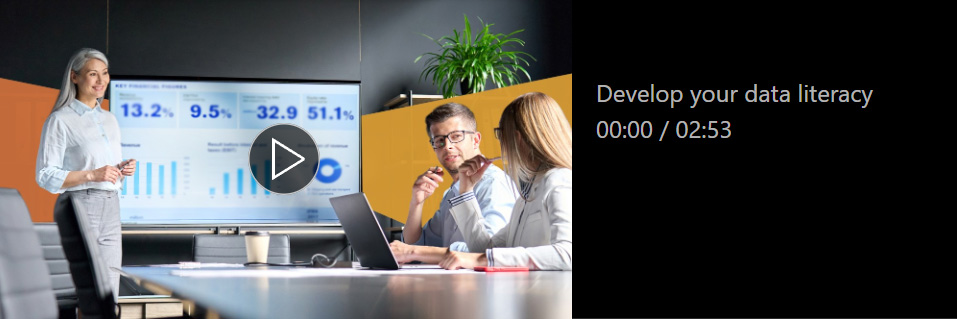Data literate
Discover the benefits of developing your data literacy skills.
Popular pages on the careers website
Data skills
Data is everywhere in your daily life, comprising facts, figures, details, and information. Being data literate means having the ability to read, understand, analyse, and communicate this data effectively.
Data skills are vital for businesses to enhance services, performance, and meet customer needs. However, it's not only data scientists who use these skills. It's essential to recognise that data is relevant in various careers, with the level of engagement varying across different fields.
Reflect
- Do you have experience of finding and using data and statistics in your work?
- How could you develop your skills in interpreting and analysing data?
- Are you confident using numbers and managing your finances?
In the next section you will see how you can develop this skill.
Develop your skills
Boost your data literacy skills! Try these activities:
- The Data Literacy Project: Take free online courses to become data fluent, mastering data interpretation and usage in everyday and professional life.
- Online Privacy and Data Protection eLearning: Understand the risks associated with the virtual world, gain tips for managing those risks, and learn about General Data Protection Regulations (GDPR).
- LinkedIn Learning: Access a wide range of technology courses, including Data Analysis, Business Intelligence, and Big Data, for free using your university email account.
- Jobs and Work Experience: Gain real-world experience to practice data analysis skills through internships, placements, part-time jobs, or volunteering.
- Virtual Work Experience: Complete online virtual work experiences with top companies, such as Forage, to simulate real work tasks.
- Join a club or society with the Students' Union: Analyse recruitment and engagement trends within societies to sharpen your data skills.
Once you have started to consider how you can develop your skills, start to think about how you might be able to showcase them during your career journey.
Demonstrate your employability skills
You will be asked to provide evidence of your skills in job applications, CVs and interviews – articulating where, when, why and how successfully you have used your employability skills. Top tips:
- Start with noting down examples of your skills on our Employability Skills Checklist
- Keep this as a record to use when completing applications and preparing for interviews.
Reflect on your journey
- Identify the skills you're using in your studies.
- Record all your experiences (paid work, voluntary work, roles in clubs or societies, for example) using our Employability Skills Activity Sheet
- Maintain your skills audit for future reference.
- Pinpoint any challenging skills or qualities you are struggling to evidence.
- Take action to bridge any skills gap.
Check out our employability guide (perfect for new students) to unlock opportunities and more ideas to help you develop your employability skills.

How to best demonstrate your skills to employers
Be positive and relevant
- Give examples of the most relevant skills first from your job, internship or work experience
- Use confident language to describe your skills, for example, praise employers have given you.
- Better to focus on transferable skills than routine tasks on your CV, gained through part-time jobs.
Sell your skills in different ways
These are just a few examples:
- Social Media including a Linked-In Profile
- Networking opportunities
- CV, Covering Letters, Application Forms
- Interview and Assessment Centres
- Presentations
Think beyond common skills
Our Employability Skills are probably ones you are familiar with. But there are some you might not be familiar with, such as meta-skills. A meta-skill like a master skill – it's something that can help you in lots of different environments.
Think also about:
- Subject skills e.g. Software, use of Lab equipment or research methodology
- Talents and abilities e.g. Languages, drawing skills, athletic
- Personal qualities e.g. Calmness, tenacious, creative, supportive
Match skills to your employer
Research the employer – what is their company culture? Look on their website and see what their company beliefs are.
Look at the job description you have. You should be able to find some of the employability skills they are looking for.
Use the STAR technique to help you relate the employability skills into your answers and examples.
Speak to a Careers Adviser
Get guidance from our friendly team of Advisers.
Open to current students and Salford Alumni only.

